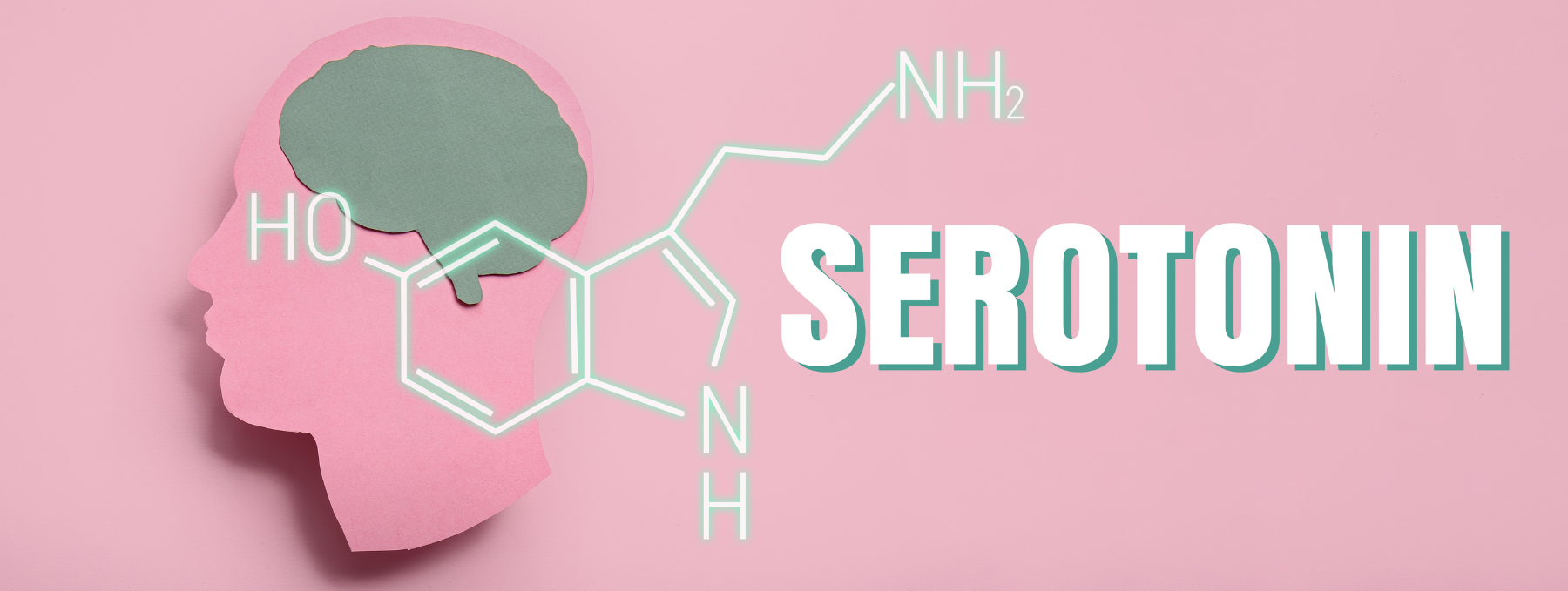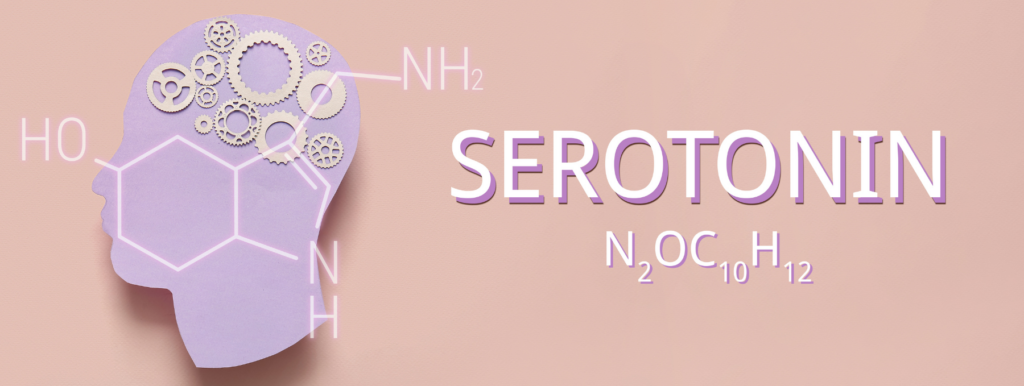Serotonin, sometimes referred to as the “feel-good” neurotransmitter, is a crucial chemical messenger in the brain that significantly influences mood, emotions, sleep, appetite, digestion and more. When the body experiences a deficiency in serotonin, it can lead to a wide array of symptoms, including anxiety, depression, fatigue, insomnia, changes in appetite and gastrointestinal problems, which can profoundly affect one’s overall quality of life. Here, we will delve into the most common symptoms of serotonin deficiency and examine their implications in relation to both mental and physical health.
What is Serotonin?
Serotonin is a neurotransmitter that is produced primarily in the brain, intestines and blood platelets. Serotonin plays a multifaceted role in the body: perhaps most importantly, it helps to regulate mood and influences anxiety levels, making it essential for mental health. Additionally, serotonin influences other bodily functions, such as sleep, where it helps regulate sleep patterns and the sleep-wake cycle, and appetite, as it plays a role in controlling hunger and satiety. Adequate levels of serotonin are also necessary for healthy digestion and pain perception. Given the wide-ranging effects of serotonin, being deficient in this important neurotransmitter can lead to a host of unwelcome symptoms, both mental and physical.
The Symptoms of Serotonin Deficiency
Symptoms of serotonin deficiency can vary widely and affect both mental and physical health. Recognizing these symptoms is crucial for understanding the impact of low serotonin levels on overall well-being. Below, we will delve into the top symptoms of serotonin deficiency and explore how it can negatively influence quality of life.
1. Depression
 One of the most well-known symptoms of serotonin deficiency is depression. Those with serotonin deficiency may experience persistent feelings of sadness, hopelessness and a lack of interest in activities they once enjoyed. Depression caused by serotonin deficiency can manifest in various ways, including:
One of the most well-known symptoms of serotonin deficiency is depression. Those with serotonin deficiency may experience persistent feelings of sadness, hopelessness and a lack of interest in activities they once enjoyed. Depression caused by serotonin deficiency can manifest in various ways, including:
- Major Depressive Disorder: Characterized by severe symptoms that interfere with daily life.
- Persistent Depressive Disorder (Dysthymia): A chronic form of depression that lasts for years but is less severe than major depression.
The link between serotonin and depression has been well-documented, with many antidepressant medications targeting serotonin levels to alleviate symptoms.
2. Anxiety
Anxiety disorders are another common consequence of serotonin deficiency. Those with anxiety disorders may experience heightened feelings of worry, nervousness or fear, which can lead to:
- Generalized Anxiety Disorder (GAD): Characterized by excessive worry about various aspects of life.
- Panic Disorder: Involves recurrent panic attacks and intense fear.
- Social Anxiety Disorder: A fear of social situations that can lead to avoidance behaviors.
Low serotonin levels can contribute to the development of these anxiety disorders, making it essential to address the underlying deficiency.
3. Irritability
Increased irritability is a common symptom of serotonin deficiency. Those with low levels of serotonin may find themselves more sensitive to stress and frustration, leading to:
- Mood Swings: Rapid changes in mood that can be triggered by minor events.
- Frustration: Difficulty managing emotions, which can lead to outbursts or withdrawal.
This irritability can strain relationships and impact overall well-being, making it crucial to recognize and address serotonin deficiency.
4. Fatigue
Chronic fatigue is another symptom often associated with serotonin deficiency. Serotonin deficiency can cause a persistent lack of energy, even after adequate rest. This fatigue can manifest as:
- Physical Exhaustion: A general feeling of tiredness that does not improve with sleep.
- Mental Fatigue: Difficulty concentrating or staying focused on tasks.
Fatigue can significantly impact daily life, making it challenging to engage in work, social activities, or self-care.
5. Sleep Disturbances
Serotonin plays a crucial role in regulating sleep patterns. A serotonin deficiency can lead to various sleep disturbances, including:
- Insomnia: Difficulty falling or staying asleep, leading to restless nights.
- Sleep Apnea: A condition characterized by interrupted breathing during sleep.
- Hypersomnia: Excessive daytime sleepiness or prolonged sleep.
These sleep disturbances can further exacerbate other symptoms of serotonin deficiency, creating a cycle of poor mental and physical health.
6. Changes in Appetite
Serotonin is involved in appetite regulation, and a deficiency can lead to changes in eating habits. Changes in appetite can include:
- Increased Cravings: A strong desire for carbohydrates or sugary foods, which can lead to weight gain.
- Loss of Appetite: A decreased interest in food, which can potentially lead to weight loss.
These changes can have significant implications for overall health, as they can affect energy levels, mood and physical well-being.
7. Difficulty Concentrating
Cognitive symptoms are also prevalent in individuals with serotonin deficiency. Difficulty concentrating can manifest as:
- Brain Fog: A feeling of mental cloudiness or confusion.
- Memory Issues: Trouble recalling information or making decisions.
These cognitive challenges can hinder productivity and daily functioning, making it difficult to perform at work or engage in social activities.
8. Social Withdrawal
Those with serotonin deficiency may experience social withdrawal, which can, in turn, lead to feelings of isolation. This can manifest as:
- Avoidance of Social Situations: A reluctance to engage in gatherings or activities with friends and family.
- Disconnection from Others: Feeling emotionally distant or unable to connect with loved ones.
This withdrawal can create a vicious cycle, as isolation can further exacerbate feelings of depression and anxiety, leading to a decline in overall mental health.
9. Increased Sensitivity to Pain
 Serotonin also plays a role in pain perception. A deficiency can lead to increased sensitivity to physical discomfort, resulting in:
Serotonin also plays a role in pain perception. A deficiency can lead to increased sensitivity to physical discomfort, resulting in:
- Chronic Pain Conditions: Conditions such as fibromyalgia or migraines may become more pronounced.
- Generalized Pain Sensitivity: A heightened perception of pain in response to stimuli that would typically be tolerable.
This increased sensitivity can significantly impact daily life, making it challenging to engage in physical activities or maintain a healthy lifestyle.
10. Digestive Issues
Serotonin is found primarily in the gastrointestinal tract, where it helps regulate digestion. A serotonin deficiency can lead to various digestive issues, including:
- Irritable Bowel Syndrome (IBS): A common condition characterized by abdominal pain, bloating and changes in bowel habits.
- Nausea: A feeling of queasiness or discomfort in the stomach.
These digestive problems can further contribute to feelings of anxiety and depression, creating a complex interplay between mental and physical health.
The Impact of Serotonin Deficiency on Daily Life
Serotonin deficiency significantly affects daily life because it can impact relationships and work performance. The most notable effects are on mental health, where those with this condition may experience persistent sadness, anxiety and irritability, increasing the risk of disorders like major depression and anxiety. This can lead to difficulties in coping with stress, which can result in burnout or emotional exhaustion.
Physical health can also be compromised, with symptoms like chronic fatigue, sleep disturbances and digestive issues reducing immune function and increasing susceptibility to illness. Changes in appetite can cause unhealthy weight fluctuations, further affecting overall health.
Socially, serotonin deficiency can lead to withdrawal and irritability, straining relationships with family, friends and colleagues. Those with serotonin deficiency may struggle to connect, resulting in feelings of isolation and loneliness. Mood swings can exacerbate tensions, complicating interpersonal dynamics. Overall, serotonin deficiency profoundly influences various life aspects.
Addressing Serotonin Deficiency
Recognizing the symptoms of serotonin deficiency is the first step toward addressing the issue. Below are some potential strategies for managing and improving serotonin levels.
Lifestyle Changes
Making positive lifestyle changes can significantly impact serotonin levels and improve overall well-being. Regular exercise is one of the most effective ways to boost serotonin production and enhance mood; aiming for at least 30 minutes of moderate physical activity most days of the week can yield substantial benefits. Additionally, maintaining a balanced diet is crucial. Consuming foods rich in tryptophan, such as turkey, eggs and nuts, can support serotonin synthesis. It is also important to incorporate plenty of fruits, vegetables, whole grains and healthy fats into your diet for optimal nutrition.
Prioritizing adequate sleep is also essential for mental health. Establishing a regular sleep schedule and creating a restful environment can help improve sleep quality and, in turn, support serotonin levels. By making these lifestyle changes, individuals can take proactive steps toward enhancing their body’s serotonin production and overall mental health.
Mindfulness and Stress Management
Practicing mindfulness and stress management techniques can be highly effective in alleviating symptoms of serotonin deficiency. One beneficial approach is regular meditation, which has been shown to reduce anxiety and improve overall well-being. Additionally, engaging in yoga can be particularly helpful, as it combines physical movement with mindfulness, enhancing mood and reducing stress levels.
Simple deep breathing exercises are another valuable tool. These techniques can help calm both the mind and body, promoting relaxation and a sense of peace. By incorporating mindfulness practices into daily routines, it is possible to foster a greater sense of balance and emotional stability, ultimately supporting mental health and well-being.
Professional Support
If symptoms of serotonin deficiency persist or significantly impact daily life, seeking professional support becomes essential. One effective option is therapy, particularly cognitive-behavioral therapy (CBT) and other therapeutic approaches, which can help people develop coping strategies and address underlying issues contributing to their symptoms. In some cases, healthcare providers may also prescribe medication, such as selective serotonin reuptake inhibitors (SSRIs), which specifically target serotonin levels to alleviate symptoms of depression and anxiety.
Additionally, monoamine oxidase inhibitors (MAOIs) may be considered for those who do not respond well to SSRIs or who have specific treatment needs. By pursuing professional support, people experiencing serotonin deficiency can gain valuable insights and tools to manage their condition more effectively, leading to improved mental health and overall well-being.
Supplements
 Certain supplements may also support serotonin production, but it is essential to consult with a healthcare professional before starting any new supplements. One option is 5-HTP (5-Hydroxytryptophan), which serves as a precursor to serotonin and may help increase its levels in the brain. Tryptophan, an amino acid found in various protein-rich foods, is another important supplement; it is a direct precursor to serotonin and can help boost its production when taken as a supplement.
Certain supplements may also support serotonin production, but it is essential to consult with a healthcare professional before starting any new supplements. One option is 5-HTP (5-Hydroxytryptophan), which serves as a precursor to serotonin and may help increase its levels in the brain. Tryptophan, an amino acid found in various protein-rich foods, is another important supplement; it is a direct precursor to serotonin and can help boost its production when taken as a supplement.
Omega-3 fatty acids, commonly found in fish oil, have also been shown to support brain health and may improve mood. Additionally, vitamin D is important, as low levels have been linked to mood disorders and supplementation may help enhance serotonin levels. B vitamins, particularly B6 and B12, play a crucial role in neurotransmitter synthesis and may further support serotonin production. Incorporating these supplements under the guidance of a healthcare provider can be a valuable part of a comprehensive approach to managing serotonin deficiency and improving overall mental health.
Embracing a Holistic Approach to Overcoming Serotonin Deficiency
Serotonin deficiency can lead to a wide array of symptoms that can significantly impact a person’s mental and physical health. From depression and anxiety to fatigue and digestive issues, the effects of low serotonin levels can be profound and far-reaching. Recognizing these symptoms is crucial for seeking appropriate support and making necessary lifestyle changes. By adopting a holistic approach that includes lifestyle modifications, mindfulness practices, professional support and potential supplementation, those with a serotonin deficiency can work towards improving their serotonin levels and overall well-being.




